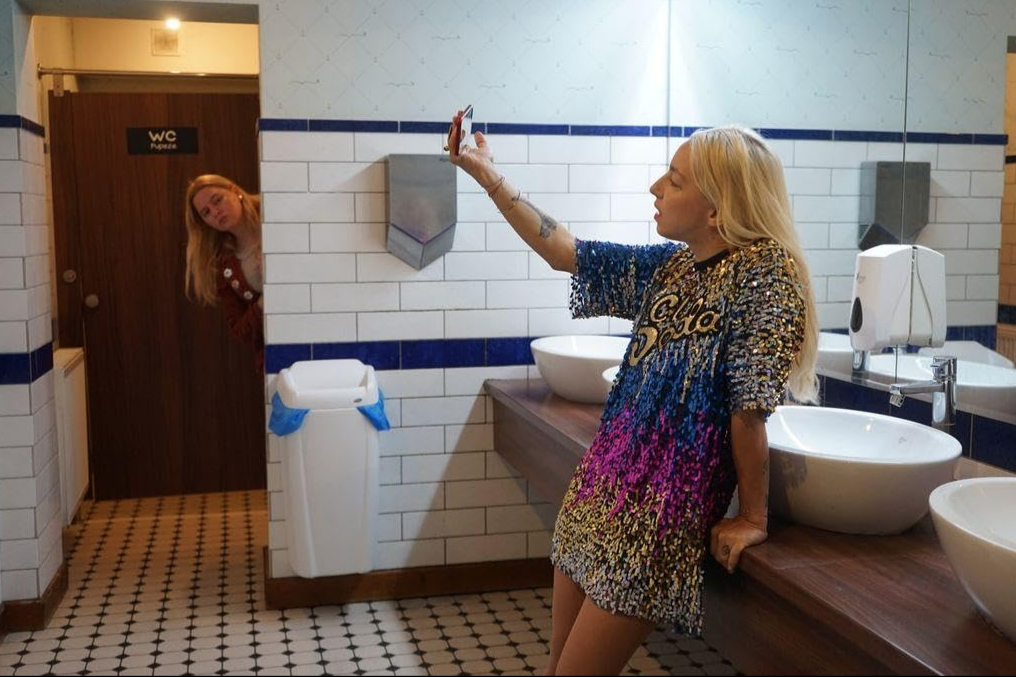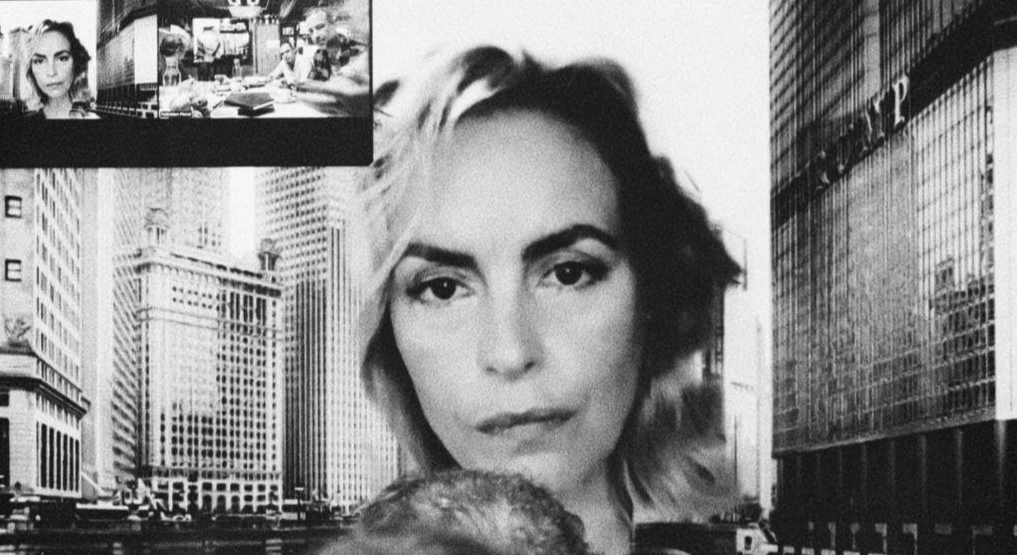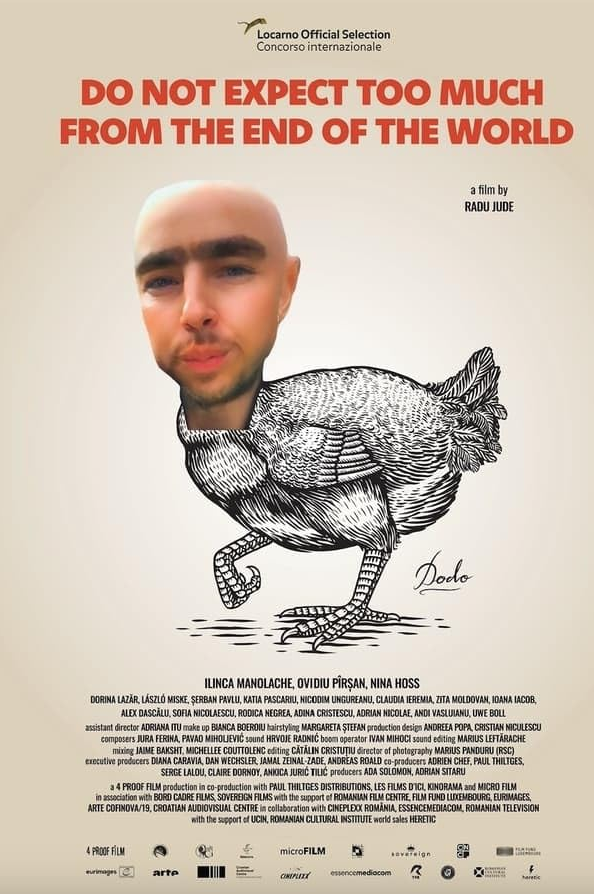TIFF '23: "Do Not Expect Too Much From the End of the World" is one wild ride
 Saturday, September 9, 2023 at 11:00PM
Saturday, September 9, 2023 at 11:00PM So many films wear the label of "provocative" as a medal of honor, boasting about their challenges to the audience and engaging shock. Yet, most of those reveal themselves as anything but, their provocation an empty buzzword for a press release. Because disappointment is so common, it feels doubly refreshing when a genuinely provocative film comes about, like a punch to the solar plexus that makes you smile and beg for more. That's the case of Radu Jude's Do Not Expect Too Much from the End of the World, a Locarno prize-winner recently announced as Romania's official submission for the 96th Academy Awards. Pardon the vulgarity, but it's a fucking masterpiece...
You know you're in the hands of a master filmmaker when a 163-minute movie flies by like a swift miracle. This particular picture deserves the world whose end it proclaims. Indeed, as the rudimentary cardboard credits of Do Not Expect Too Much from the End of the World dropped and the theater lights went up in the press screening, a bubble of euphoria swelled up inside, and I almost stood up clapping to no one in particular. How does Jude do it?
It may start with an artist's honest acknowledgment that their art form contains endless possibilities, a humbling but freeing notion that unlocks the doors for experimentation galore. Here, that manifests early on as the retread of a 1981 Romanian movie about a woman taxi driver, Angela Goes On, whose original cut has been tampered with by censors over history. The director posits footage from that film as existing in conversation with his new material, also about a woman called Angela driving around Bucharest for over-extended and shamelessly exploitative work hours. She's a production assistant, currently working on a safety video for some Austrian manufacturer.

Though separated by fifty years, many of the same pressures and insidious influences befall the new Angela as they did the old. The ghosts of Ceausescu's dictatorship define the very morphology of the city, while old prejudices still run rampant; Derogatory talk of Romania comes up, and a certain admiration for far-right politics. If the Angela of yore drove around folk who needed a ride, the Angela of today circulates through the streets in search of stories. She must audition injured workers from the international conglomerate for the company's current project, taking their pictures and testimony. Though the Austrian behemoth wants what amounts to internal propaganda, you soon realize that the people interviewed may not realize the totality of their plight or are too desperate to care. Almost everyone describes accidents that weren't their fault, life-changing tragedies that wouldn't have been prevented by wearing a hard hat, no matter what the higher-ups say.
There's a vicious dishonesty to Angela's labor this busy day, but not to the woman herself. She is exceedingly blunt and direct, often vulgar, full of contradictions as both a sufferer and perpetrator of unjust systems. Angela is bursting with literary references that further complement the director's post-modern take on cinema as a comparative art piece. She's also funny as all hell, eager to entertain herself and her social media followers through a bizarre philter-augmented alter ego who spouts hateful nonsense and boasts about his friendship with Andrew Tate. Through this "Bobita" character, Jude's provocations take the shape of a nesting doll structure, while the image finds another disruptor among many.
Old Angela's story is beautifully restored color film, while new Angela's life is high-contrast black-and-white, so grainy it feels like it is on the verge of collapse at all times. A vigorous shake might untether the grayscale dots from each other, and catapult Do Not Expect Too Much from the End of the World straight into abstraction. Bobita's streams, however, bring the ugly digital smoothness of a phone camera, colors glaring with no rhyme or reason for a picture quality as crude as its fictional-within-fiction subject. The cutting mechanisms stretch these disordering breaks into chasms that somehow flow together.
Indeed, as mentioned before, this thing flows like nobody's business, arthouse inaccessibility is a falsity. Like its protagonist, the picture's a laugh riot while offering a scathing critique ringing with political outrage. Jude's playfulness keeps the material from academic inscrutability, but that only sharpens his claws and adds strength to the bite. The union of post-Soviet Romanian malaise with the gig economy's hypocritic viciousness is thoroughly vivisected, metaphorical blood everywhere and guts spilling from the screen.
When new Angela drives to the airport to pick up a representative from the Austrian client (German movie star Nina Hoss) -- a descendant from Goethe of all people -- the film enters its last act where it sticks the landing and then some. Here, Nina Hoss is capitalism's pretenses embodied from head to toe, contrasting nicely with Ilinca Manolache's bold star-making turn. Later, as the assistant's hellish day finally comes to an end, Jude hits us with a bravura gesture, jumping to the safety video shoot.

All in one static take, this last sequence could be a film by itself, and I'd still feel comfortable calling it a masterpiece. For those interested in experiencing the film fresh, I won't spoil all that happens, but it's both mundane and funny, imbued with such sharpness you feel the razor's caress. Jude has done it again. He's managed to surprise and delight, playing with cinema as magnifying glass cum scalpel, a mirror, and frenetic reference machine. Few filmmakers are as daring as Radu Jude and almost none have been able to synthesize the present moment as perfectly as the man's done here, in this apocalyptically-titled comedy for the ages.
Do Not Expect Too Much From the End of the World will represent Romania in the Oscar race.



